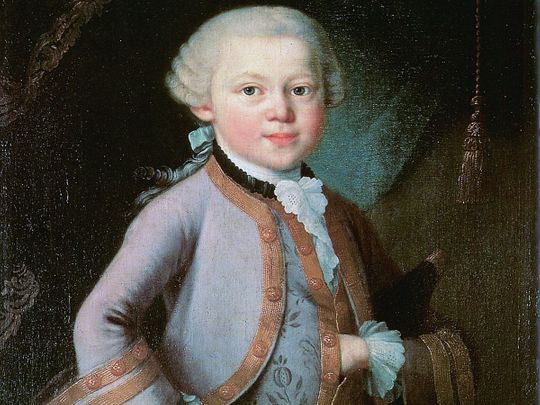
For most people, adolescence is a time of joy and care-free play, with no worries or responsibilities to weigh one down.
Click start to play today’s Crossword where you can answer an adolescence-related question in the 8-Across clue.
Standing apart from the vast majority, there are a few boys and girls who exhibit signs of genius from a very young age. Not all gifted children go on to achieve great things as adults, but here are three who did, spectacularly:
1. Wolfgang Amadeus Mozart
The Austrian composer played songs on the harpsichord at four years old, and began to compose simple music at five. When he was only seven, his family took him and his older sister Maria Anna (who was also musically gifted) on the first of many tours in royal courts and public concerts, to demonstrate their musical abilities. Mozart had the ability to sight-read unfamiliar music, play the piano blindfolded, and with one hand crossed over the other. He grew to become one of Europe’s most celebrated composers, and when he died at age 35, he had written more than 600 pieces of music.
2. Srinivasa Ramanujan
With singular focus and an obsessive thirst for knowledge, Indian mathematician Srinivasa Ramanujan grew up to become one of the greatest self-taught mathematicians of all time. He displayed a love for numbers at an early age. At 16, he borrowed an outdated copy of advanced mathematics and studied it zealously, carrying it with him everywhere. His passion for maths was so complete, it hurt him in other areas of life – he lost a scholarship to the University of Madras in 1904, because he had absolutely no interest in other academic fields of study. But later on, while working as a clerk, Ramanujan struck a correspondence with Godfrey Hardy, a mathematician at Cambridge University in the UK. Hardy received papers from Ramanujan, which included unusual and potentially important mathematical formulas and findings. Hardy convinced Ramanujan to come to Cambridge, where he tutored and collaborated with him. Ramanujan published prolifically over the next few years, but because of his delicate health, passed away in 1919, at the age of 32.
3. Polgar sisters
Hungarian educational psychologist Laszlo Polgar was convinced that any child could be turned into a prodigy through proper training. He even wrote a manual called ‘Raise a Genius!’ describing how to do so. While Polgar’s ideas might have sounded outlandish at the time, his three daughters seem to have proved him right: all three turned out to become chess prodigies, under his tutelage. At 15, his eldest daughter, Susan, became the top-ranked female player in the world, and in January 1991, became the first woman to earn the title of grandmaster, calculated on the same basis as male players. But even she was soon eclipsed by her youngest sister Judit. In 1991, Judit became the youngest player ever to become grandmaster, breaking the record set by American grandmaster Bobby Fischer in 1958. Judit avoided women-only events in her career, instead focusing on playing – and usually defeating – the best male chess players in the world.
What do you think of these child prodigies? Play today’s Crossword and tell us at games@gulfnews.com.



